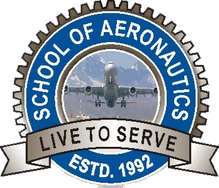Technical Website of School of Aeronautics
LEADERS IN AVIATION INDUSTRY
30 YEARS OF GLORIOUS SERVICE TO AVIATION INDUSTRY,
[ Approved By AICTE / Director General of Civil Aviation, Affiliated to RTU ]
SOA WAS AWARDED "TOP 10 AERONAUTICAL ENGINEERING COLLEGE IN INDIA" BY CMAI, SUPPORTED BY AICTE, AIU, RTU, NIELIT, NSIC, DEPARTMENT OF MNRE, MSME (GOVERNMENT OF INDIA)
Summer Training For
B.Tech (Aeronautical Engineering)
Students
INTRODUCTION
School of Aeronautics established in 1992, since then we are into providing world class Aviation Education, in various disciplines. School of Aeronautics (Neemrana) established in 2006, after successfully running School of Aeronautics (Delhi) for 14 years.
School of Aeronautics (Neemrana) is situated in NCR on New Delhi Jaipur National Highway No.8 and is just 2 hours drive from New Delhi, six lane express way. The functional & technical infrastructure is operational on sprawling 5 acres campus set in serene environment. The confluence of minds and cultures from all over the Aviation industry provides the ambience in shaping the students into aviation leaders.
All the labs related to Aeronautical, Aerospace and Aircraft Maintenance Engineering are very well developed in college. We have our own Fokker Friendship F 27 aircraft which are 92 percent serviceable. We are approved by DGCA to provide On Job Training to students on our Aircrafts.
In addition to providing technical courses to students, we are also in equipment rental to Aviation Industry. These equipments serve two purpose of rental and training to prospective aviation engineers of the country. In order to utilize the sources for the students training, we have formulated the Industrial training module for them.
School of Aeronautics will be conducting “Industrial Training” for the students of various Aeronautical Engineering, Aerospace Engineering and Aircraft Maintenance Engineering Colleges This training is for a period of six weeks during which the students are housed at SOA campus at Neemrana.
As we aware that students of B.Tech need to undergo Industrial Training during sixth semester hence following experiments has been designed for them
BASIC EXPERIMENTS
Smoke visualization over cylinder and airfoil section to show boundary layer separation.
To acquaint with aircraft fuselage constructional details and types.
Study off fuselage structure i.e. Longerons, bulkhead stringers etc.
To acquaint with aircraft wing constructional details and types.
To acquaint with aircraft primary control surfaces along with their locations on aircraft.
To acquaint with aircraft secondary flight control surfaces along with their locations on aircraft
Study of Piston engine and its components like cylinder block, piston, camshaft, crankshaft, piston rod, valves etc.
Study of Jet Engine and its components like inlet, compressors, combustion chambers, turbine exhaust cone etc.
To acquaint with different types of Jet Engine e.g. Turbojet, turboprop, turboshaft.
AIRCRAFT SYSTEM EXPERIMENTS
Aircraft “Jacking Up” procedure
Aircraft “Levelling” procedure
Control System “Rigging check” procedure
Aircraft “Symmetry Check” procedure
“Flow test” to assess of filter element clogging
“Pressure Test” To assess hydraulic External/Internal Leakage
“Functional Test” of Hydraulic Actuator for its proper operation, leakage and load test.
“Pressure Test” procedure on fuel system components
“Brake Torque Load Test” on wheel brake units
Maintenance and rectification of snags in pneumatic, hydraulic and fuel systems components and on Aircraft.
Functional Test of Fire detection system on aircraft.
Functional Test of Aircraft Pressurization System on aircraft.
Functional Test of aircraft landing gear retraction system and its relevant indications in the cockpit.
Identification of various components, pipelines with color coding on aircraft.
Study of combustion chambers of jet engines
Study of various types hydraulic systems aircraft and its operational test.
Study of pneumatic systems of aircraft and its operational test.
Study of brake systems of aircraft and its operational test.
PROPULSION EXPERIMENTS
Calculate the cylinder area, sweep area and compression ratio.
Test the engine on piston engine test rig to determine:
A) Specific fuel consumption
B) Break horse power
C) Indicated horse power
D) Break thermal efficiency
E) Mechanical efficiency
F) Heat balance sheet
G) Air consumption
H) Volumetric efficiency for four stroke petrol engine.
Study of an aircraft jet engine - assembly of sub systems,
Study of an aircraft jet engine - various components, their functions and operating principles. To take various reading during starting and running of jet engine.
To study the functioning of aircraft gas turbine engines.
WIND TUNNEL EXPERIMENTS
Calibration of subsonic wind tunnel.
Pressure distribution over smooth and rough cylinder.
Pressure distribution over symmetric airfoil.
Pressure distribution over cambered airfoil & thin airfoils
Force measurement using wind tunnel balance.
Flow over a flat plate at different angles of incidence
Flow visualization studies in low speed flow over cylinders
Flow visualization studies in low speed flow over airfoil with different angle
INSTRUMENTS
To study the constructional details of direct reading compass, carry out compass swingingand prepare deviation correction card.
To study the construction details of Pitot static instruments, carry out leak test andcalibration check on Pitot-static instruments.
To study the constructional details of gyroscopic instruments and carry out calibrationcheck of gyroscopic instruments on gyro turn table.
The demonstration of operation and testing of desynn transmission system like, Fuelcontent gauge, Flap position indicator, Rudder trim indicator etc.
Demonstration and Calibration of temperature sensing devices and relevant indicators.
ELECTRICAL
Study and perform tests on aircraft power system (Batteries, Aircraft A.C generator, Aircraft D.C generator, voltage regulator, aircraft static and rotary inverters and TRU etc). & verify their characteristics.
Study and test a/c power distribution system.
To study and test a/c internal and external lighting system.
FEE
The course fees and boarding and lodging charges are as following
The charges for training is Rs. 15000/- per student.
The tentative charges to be paid by students individually directly to the hostel:
• Rs. 1000/- security Money (refundable)
• Rs. 150/- per day for Mess (Breakfast, Lunch, Evening Snacks and Dinner).
• Rs. 250/- per day for Room Rent (Non AC).
The fees for training is to be paid in advance by
Demand draft in favor of
SCHOOL OF AERONAUTICS
payable at New Delhi.
